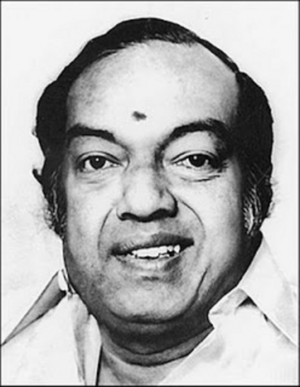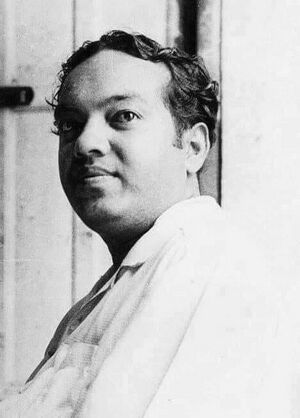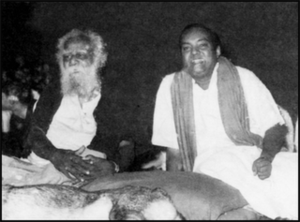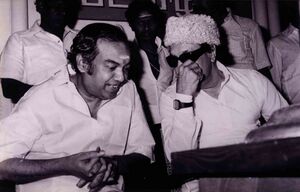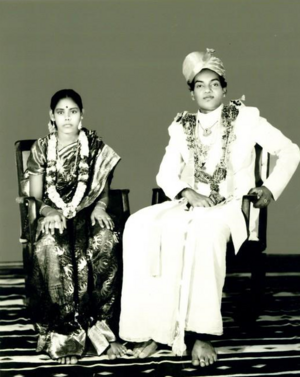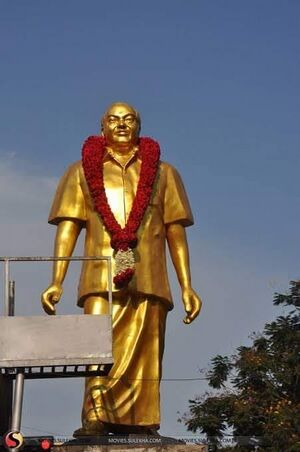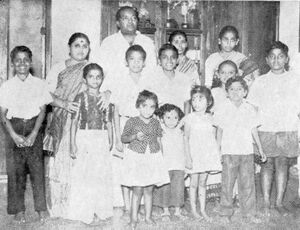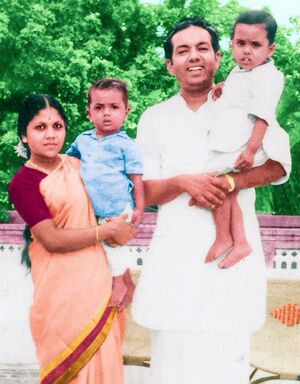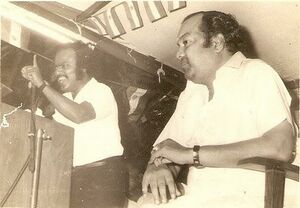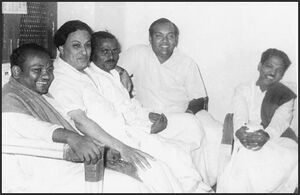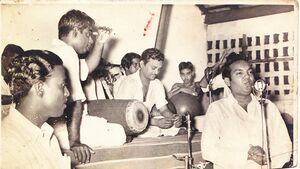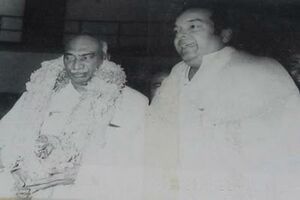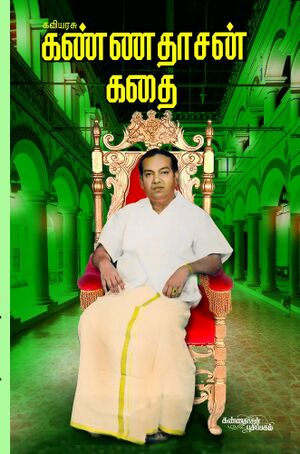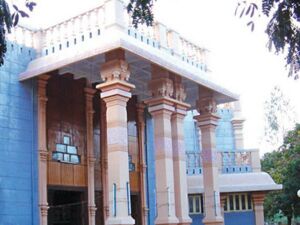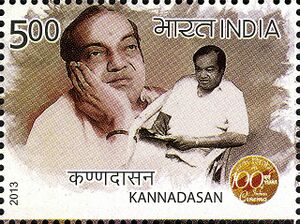Kannadasan: Difference between revisions
(Corrected error in line feed character) |
(Recomposed many sentences for better readability. replaced some transliterated words. highlighted important sentences . re-translated. corrected typos.) |
||
| Line 2: | Line 2: | ||
[[File:கண்ணதாசன்.png|thumb|Kannadasan]] | [[File:கண்ணதாசன்.png|thumb|Kannadasan]] | ||
[[File:கண்ணதாசன்4.jpg|thumb|Younger Kannadasan]] | [[File:கண்ணதாசன்4.jpg|thumb|Younger Kannadasan]] | ||
Kannadasan (June 24, 1927 – October 17, 1981) was a Tamil poet, Film Lyricist, Writer, Journalist, Politician, Spiritual | Kannadasan (June 24, 1927 – October 17, 1981) was a Tamil poet, Film Lyricist, Writer, Journalist, Politician, Spiritual Orator. Kannadasan, who rose to fame through Tamil film songs, was a supporter of the early Dravidian movement and later a supporter of the Congress. He wrote Short Epics and assorted Songs. He is known as the last important poet who wrote in Classical Poetry. | ||
==Birth, Education== | ==Birth, Education== | ||
Kannadasan was born as the | Kannadasan was born as Mutthiah , as the eighth son of Sathappan Chettiar and Visalakshi Aachi couple in a Naattukottai Nagaratthar clan on June 24, 1927, in Sirukoodalpatti near Karaikudi, Tamil Nadu, India. Along with his 10 siblings (six brothers, three sisters) he was jointly adopted by Palaniappa Chettiar - Chigappi Aachi at an early age. He lived in their house in the changed name Narayanan. | ||
After completing his primary education at | After completing his primary education at Sirukoodalpatti, he studied up to class eight at Amaravathiputhur High School. In 1943, at the age of 16, Kannadasan joined the firm Ajax in Thiruvottriyur, near Chennai as a worker. | ||
== | ==Personal Life == | ||
[[File:Kanna10.png|thumb|Kannadasan with E.V. | [[File:Kanna10.png|thumb|Kannadasan with E.V.R. Periyar]] | ||
[[File:Kannam9.jpg|thumb|Kannadasan with M.G.R.]] | [[File:Kannam9.jpg|thumb|Kannadasan with M.G.R.]] | ||
[[File:Kanna4.png|thumb|Kannadasan's Marriage]] | [[File:Kanna4.png|thumb|Kannadasan's Marriage]] | ||
At the age of 16 Kannadasan | At the age of 16, Kannadasan eloped to Chennai without informing home and took the nickname Chandrasekaran to look for opportunities to act in films. He started writing stories while working as an assistant at Ajax Company, Thiruvottriyur. His first story ''<nowiki/>'Nilavoliyile''' appeared in the magazine ''Grihalakshmi.'' He returned to Karaikudi in 1944 and joined ''Thirumagal'' magazine as a proofreader. That's when he took the name Kannadasan. | ||
[[File:கண்ணதாசன்6.jpg|thumb|Kannadasan Statue]] | [[File:கண்ணதாசன்6.jpg|thumb|Kannadasan Statue]] | ||
[[File:Kanna3.jpg|thumb|Kannadasan Family]] | [[File:Kanna3.jpg|thumb|Kannadasan Family]] | ||
[[File:Kanna5.jpg|thumb|Kannadasan with Wife]] | [[File:Kanna5.jpg|thumb|Kannadasan with Wife]] | ||
Kannadasan's | Kannadasan's marriage took place on February 9, 1950, in Karaikudi with Ponnazhagi alias Ponnammal. They have 4 sons Kanmanisubbu, Kalaivaanan, Ramasamy and Venkataachalam and 3 daughters Alamelu Sokkalingam, Thenammai and Visalakshi. Kannadasan remarried Parvathiammal on 11 November 1951. They have seven children namely Gandhi, Kamal, Annadurai, Gopal Krishnan, Srinivasan and 2 daughters Revathi and Kalaichelvi. At the age of fifty, Kannadasan again got married for the third time to Poet Valliammai. They have a daughter Vishaali. | ||
==Literary Life== | ==Literary Life== | ||
[[File:Kanna8.jpg|thumb|Kannadasan with Jeyakanthan]] | [[File:Kanna8.jpg|thumb|Kannadasan with Jeyakanthan]] | ||
Kannadasan's first story 'Nilavoliyile' was published in 1944 in the magazine | Kannadasan's first story ''<nowiki/>'Nilavoliyile'<nowiki/>'' was published in 1944 in the magazine Grihalakshmi. He wrote articles, political reviews and film reviews under various names such as Kaaraimuthup Pulavar, Vanangaamudi, Kamakapriya, Paarvathinathan, Arogyasamy. He wrote his first short epic ''<nowiki/>'Maankani''' in 1952-1953 while in jail for protesting the name change of Dalmiapuram town. | ||
Kannadasan's world of poetry is | Kannadasan's world of poetry is vast. He belongs entirely to the world of classical poetry. He continued to write short epics, assorted songs and sittrilakiyangal. His classical poems written in [[Kumudam (Magazine)|Kumudam]] Tamil weekly magazine were popular. [[சௌந்தரா கைலாசம்|Soundharaa Kailasam]]'s counter poem ''<nowiki/>'Maanudarai Paaduvom'<nowiki/>'' (Lets hail Humanity) to Kannadasan's poem ''<nowiki/>'Maanudarai Paadamatten''' (i dont hail humanity) was very famous. | ||
Kannadasan wrote serialized novels | Kannadasan wrote serialized novels in several magazines such as the ''vaaraanthari'' ''Rani'' weekly, popular among common readers, to the one he himself found, ''Thenral.'' The novels were for popular sections, slightly traversing the society's sexual sensualities of that time. He also wrote Historical fantasy novels, ''Cheramaan Kaathali, Kumarikkandam''. They were also meant for the common sections of the society as against for the learned / educated. | ||
==Movie Career== | ==Movie Career== | ||
In 1949, Kannadasan wrote the song | In 1949, Kannadasan wrote the song ''Kalangaathiru Maname'' in the K. Ramnoth-directed film ''Kanniyin Kaathali,'' an adaptation of William Shakespeare's Play '12th night', produced by Jupiter Films. Since then, he contributed as a lyricist in the Tamil FIlm Industry for more than thirty years, till his death. He wrote dialogues for many Tamil films starting from the film ''<nowiki/>'Illarajothi'.'' | ||
==Journalism == | ==Journalism == | ||
Kannadasan | Kannadasan had founded and ran many magazines. He has also been involved in executing many other. | ||
* | *Chandamaarutham | ||
* Mullai | * Mullai | ||
* | *Methaavi | ||
* | * [[தென்றல் இதழ்|Thenral]] | ||
*Thendralthirai | *Thendralthirai | ||
*Kannadasan | *Kannadasan | ||
| Line 37: | Line 37: | ||
[[File:Kanna6.jpg|thumb|Kannadasan Speaking]] | [[File:Kanna6.jpg|thumb|Kannadasan Speaking]] | ||
[[File:Kanna7.jpg|thumb|Kannadasan with Kamaraj]] | [[File:Kanna7.jpg|thumb|Kannadasan with Kamaraj]] | ||
In 1949 Kannadasan joined the Dravida Munnetra Kazhagam (DMK). He participated in many political events including the | In 1949, Kannadasan joined the Dravida Munnetra Kazhagam (DMK). He participated in many political events including the Kallakkudi protest and anti-Hindi protest organized by the Dravida Munnetra Kazhagam for a decade. In 1957, he contested for the Thirukoshtiyur assembly election seat and lost. On April 9, 1961, he resigned from the Dravida Munnetra Kazhagam. In 1962, he started the Tamil National Party along with E.V.K. Sampath. In 1964, the party merged with the Indian National Congress. | ||
Kannadasan became a Congress member and engaged in political campaigning as an ardent supporter of Kamaraj. After Kamaraj's | Kannadasan became a Congress member and engaged in political campaigning as an ardent supporter of Kamaraj. After Kamaraj's demise, he became a supporter of the Indian National Congress (Indra) faction. He remained a Congress supporter till his life. He severely criticized M. Karunanidhi and M.G. Ramachandran. When M.G. Ramachandran came to power, Kannadasan, was appointed as the 'State Bard' on March 28, 1978. | ||
==Spirituality == | ==Spirituality == | ||
Kannadasan was born in a | Kannadasan was born in a clan of traditional Saivites. Yet, in 1944, he rechristened himself as Kannadasan due to his devotion to Bhagavad Gita and Lord Krishna. He became a radical in 1949 when he supported the Dravida Munnetra Kazhagam. Later in his Memoirs, he says that he was still a theist inside but used to remove the ''Thiruneeru'' (holy ash) from his forehead and get on the DMK daises to favour radicalism. | ||
After leaving the Dravidian movement, he | After leaving the Dravidian movement, he was active as a Theist again. His simplified interpretation for Bhagavad Gita became popular. He did translations of many Theist texts such as Adi Shankara's ''Kanakataara Stotra''. He wrote short verses on his family deity at Sirukoodalpatti. Those songs gained him great fame. | ||
He wrote ' | He wrote several volumes of ''<nowiki/>'Artthamulla Indhu Matham'<nowiki/>'' (Hinduism the meaningful) explaining Hindu rituals and tenets of the religion in a simple manner. It is Kannadasan's best-selling book so far, which led to many similar books. But Kannadasan's spirituality was of a conciliatory nature. He compiled the story of Jesus in his later times and wrote a book called ''<nowiki/>'Yesukaviyam'''. He also intended to pen an epic on Prophet Mohammed. | ||
==Awards== | ==Awards (in Literature) == | ||
* Sahitya Academy Award (For | * Sahitya Academy Award (For Cheramaan Kaathali) | ||
== Demise== | == Demise== | ||
Kannadasan had a | Kannadasan had a habits of drugging Betadine. He got very sick and was admitted to Chicago City Hospital on July 24, 1981, and died on Saturday, October 17 at 10.45 IST. His body was brought to Chennai from USA on 20th October and cremated on 22 October 1981 with state honours after the public paid last respects. | ||
==Memorials, Memories== | ==Memorials, Memories== | ||
[[File:கண்ணதாசன் வாழ்க்கை.jpg|thumb|Kannadasan's Autobiography]] | [[File:கண்ணதாசன் வாழ்க்கை.jpg|thumb|Kannadasan's Autobiography]] | ||
[[File:KaNNathaasan.jpg|thumb|Kannadasan Manimandabam]] | [[File:KaNNathaasan.jpg|thumb|Kannadasan Manimandabam]] | ||
[[File:Kanna.jpg|thumb|Kannadasan Postal Stamp]] | [[File:Kanna.jpg|thumb|Kannadasan Postal Stamp]] | ||
Government of Tamil Nadu has constructed Kaviarasu Kannadasan Mani Mandapam near the new bus station in Karaikudi, Sivagangai district. This memorial was built at an estimated cost of Rs. 84 lakhs | Government of Tamil Nadu has constructed ''Kaviarasu Kannadasan Mani Mandapam'' near the new bus station in Karaikudi, in his native Sivagangai district. This memorial was built at an estimated announced cost of Rs. 84 lakhs, in 1981 by the then Chief Minister MGR, the foundation stone was laid in 1990 by Chief Minister Karunanidhi and after completion, was inaugurated by Chief Minister Selvi. Jayalalitha in1992. The two-storied memorial has a bust of Kannadasan. There is a gallery hall in the upper floor and a library with 2400 books in the lower floor. Photographs connected to Kannadasan's life are exhibited. | ||
In 2013, a postage stamp was issued for Kannadasan. | In 2013, a postage stamp was issued for Kannadasan. | ||
Kannadasan Kazhagam from Coimbatore presents Kannadasan Awards for Literature and Poetry. | Kannadasan Kazhagam (association) from Coimbatore presents Kannadasan Awards for Literature and Poetry. | ||
==== | ==== Biography ==== | ||
Kaviarasu Kannadasan Kathai - | ''Kaviarasu Kannadasan Kathai - Vanangaamudi'' (Kannadasan Publications) | ||
==Literary | ==Literary Position== | ||
After [[சி.சுப்ரமணிய பாரதியார்|C. Subramania Bharathiar]] and Bharathidasan, Tamil traditional poetry was carried forward by poets belonging to the [[பாரதிதாசன் பரம்பரை|Bharathidasan lineage]] and by poets of the [[நாமக்கல் கவிஞர் மரபு|Namakkal poet tradition]]. But by the 1970s most of them | After [[சி.சுப்ரமணிய பாரதியார்|C. Subramania Bharathiar]] and [[பாரதிதாசன்|Bharathidasan]], Tamil traditional poetry was carried forward by poets belonging to the [[பாரதிதாசன் பரம்பரை|Bharathidasan lineage]] and by poets of the [[நாமக்கல் கவிஞர் மரபு|Namakkal poet tradition]]. But by the 1970s most of them were inactive. Many of Bharathidasan's lineage came to the new form of poetry through the [[வானம்பாடி கவிதை இயக்கம்|Vaanampaadi poetry movement]]. The legacy of Namakkal poets vanished. | ||
Most of the poets belonging to the Bharathidasan tradition wrote political poems. So they could not work in all the niches of traditional poetry. Many of them reject traditional | Most of the poets belonging to the Bharathidasan tradition wrote political poems. So, they could not work in all the niches of traditional poetry. Many of them reject traditional mentalities. Therefore, their vocabulary could not match traditional poetry. | ||
Kannadasan is considered to be the last poet who fully revealed the diction, sound and style of traditional poetry. Due to his training in | Kannadasan is considered to be the last poet who fully revealed the diction, sound and style of traditional Tamil poetry. Due to his training in ''Yaappu'' and mastery of Classical Literature, Kannadasan wrote poetry in ''Yaappu'' with élan and spontaneity. | ||
The | The salient features of Kannadasan's poetry are: | ||
*A natural, effortless arrangement (Yappamaithi). He emerges effortlessly even in a complex | *A natural, effortless arrangement (''Yappamaithi''). He emerges effortlessly even in a complex yaappu like the ''Asiriya Viruttham'' and ''Enseer Kazinezhiladi.'' | ||
*Reconstructing and presenting beautiful rhetoric and parables taken from tradition poetry in his own way. | *Reconstructing and presenting beautiful rhetoric and parables taken from tradition poetry in his own way. | ||
*Unlike most traditional poets, he expressed his life experiences and emotions in poetry instead of writing based on what he learned. | *Unlike most traditional poets, he expressed his life experiences and emotions in poetry instead of writing based on what he learned. | ||
*A practical philosophical view, rooted in tradition and the result of personal experience, is sharply expressed in simple phrases. | *A practical philosophical view, rooted in tradition and the result of personal experience, is sharply expressed in simple phrases. | ||
Kannadasan's literary niche is through his short epics like | Kannadasan's literary niche is through his short epics like Maankani and assorted poems. | ||
Kannadasan's fictions are intended to appeal to common readers. | Kannadasan's fictions are intended to appeal to the common readers. The worksy were adored in those times. | ||
==Books== | ==Books== | ||
====Poetry==== | ====Poetry==== | ||
=====Epics===== | =====Epics===== | ||
*'' | *''Aattanatthi Aathimanthi'' | ||
*''Yesu Kaviyam'' | *''Yesu Kaviyam'' | ||
*'' | *''Aingurunkaappiyam'' | ||
*'' | *''Kallakkudi Maha Kaaviyam'' | ||
*''Kizhavan Sethupathi'' | *''Kizhavan Sethupathi'' | ||
*'' | *''Paandimadevi'' | ||
*'' | *''PerumpayaNam'' | ||
*''Malargal'' | *''Malargal'' | ||
*'' | *''Maankani'' | ||
*'' | *''Muttruperaatha Kaaviyangal'' | ||
===== Collections===== | ===== Collections===== | ||
*''Kannadasan Kavithaigal - 1959, | *''Kannadasan Kavithaigal - 1959, Kaaviyakazhagam, Chennai - 2, Vanathi Pathipaga First edition 1968'' | ||
* ''Kannadasan kavithaigal: Irandam Thoguthi - 1960, Kaviyakazhagam, Chennai, Vanathi Pathipaga | * ''Kannadasan kavithaigal: Irandam Thoguthi - 1960, Kaviyakazhagam, Chennai, Vanathi Pathipaga First Edition 1968'' | ||
*''Kannadasan Kavithaigal: Muthaliru Thoguthigal'' | *''Kannadasan Kavithaigal: Muthaliru Thoguthigal'' | ||
* ''Kannadasan Kavithaigal: Mundram Thoguthi - 1968, Vanathi Pathipagam, Chennai'' | * ''Kannadasan Kavithaigal: Mundram Thoguthi - 1968, Vanathi Pathipagam, Chennai'' | ||
| Line 98: | Line 98: | ||
*''Kannadasan Kavithaigal: Aaram Thoguthi - 1976, Vanathi Pathipagam, Chennai'' | *''Kannadasan Kavithaigal: Aaram Thoguthi - 1976, Vanathi Pathipagam, Chennai'' | ||
*''Kannadasan Kavithaigal: Ezham Thoguthi - 1986, Vanathi Pathipagam, Chennai'' | *''Kannadasan Kavithaigal: Ezham Thoguthi - 1986, Vanathi Pathipagam, Chennai'' | ||
*'' | *''Paadikodutha MangaLangal'' | ||
=====Sittrilakkiyangal===== | =====Sittrilakkiyangal (micro literature)===== | ||
*'' | *''Ambikai AzhaguDharisanam'' | ||
*''Krishna | *''Krishna Anthaathi'' | ||
*''Krishna | *''Krishna Gaanam'' | ||
*''Krishna | *''Krishna Manimaalai'' | ||
*''Srikrishna | *''Srikrishna Kavacham'' | ||
*''Srikrishna Jeyanthi'' | *''Srikrishna Jeyanthi'' | ||
*''Srivengatesa | *''Srivengatesa Suprabaatham'' | ||
*'' | *''Thypaavai'' | ||
=====Poetic Plays===== | =====Poetic Plays===== | ||
*'' | *''Kavithaanjali'' | ||
=====Translations===== | =====Translations===== | ||
*''Ponmazhai ( | *''Ponmazhai (''of Adi Sankara's ''Kanakathaara Sthotra)'' | ||
* '' | * ''Baja Govindham'' | ||
====Novels==== | ====Novels==== | ||
*''Avalukkaga Oru | *''Avalukkaga Oru Paadal'' | ||
*''Aval Oru | *''Aval Oru Hindu Pen'' | ||
*''Arangamum Andarangamum'' | *''Arangamum Andarangamum'' | ||
*''Athaivida Ragasiyam'' | *''Athaivida Ragasiyam'' | ||
*''Aachi | *''Aachi'' | ||
*'' | *''Ayirankaal Mandapam'' | ||
*''Ayiram Theevu Angayarkanni - 1956 | *''Ayiram Theevu Angayarkanni - 1956'' | ||
*'' | *''Umaiyankoattai'' | ||
*''Oru Kavignanin Kathai'' | *''Oru Kavignanin Kathai'' | ||
*''Kadal Konda | *''Kadal Konda Thennaadu'' | ||
*'' | *''Kaamini Kanjana'' | ||
*''Sarasuvin | *''Sarasuvin Soundharya Lahari'' | ||
*'' | *''Sivappukkal Mookutthi'' | ||
*''Singari Partha Chennai'' | *''Singari Partha Chennai'' | ||
*''Suruthi | *''Suruthi Seraatha Raagangal'' | ||
*'' | *''Cheramaan Kaathali'' | ||
*''Theiva | *''Theiva ThirumaNangal'' | ||
*''Nadantha Kathai'' | *''Nadantha Kathai'' | ||
*''Paarimalaikodi'' | *''Paarimalaikodi'' | ||
*'' | *''Brindaavanam'' | ||
*'' | *''Misaa'' | ||
*''Muppathu Naalum Pournami'' | *''Muppathu Naalum Pournami'' | ||
*'' | *''Rattha Pushpangal'' | ||
*'' | *''ViLakku Mattumaa Sivappu'' | ||
*''Velangudi Thiruvizha'' | *''Velangudi Thiruvizha'' | ||
*''Swarna Saraswathi'' | *''Swarna Saraswathi'' | ||
====Short Stories==== | ====Short Stories==== | ||
*'' | *''Eezhatthu rani'' | ||
*''Oru Nathiyin Kathai'' | *''Oru Nathiyin Kathai'' | ||
*''Kannadasan Kathaigal'' | *''Kannadasan Kathaigal'' | ||
*'' | *''Kaathal Palavitham - Kathaligal Palaragam'' | ||
*''Kuttikathaigal'' | *''Kuttikathaigal'' | ||
*'' | *''Penaa Naattiyam'' | ||
*''Manasukku Thookamillai'' | *''Manasukku Thookamillai'' | ||
*''Shenbagathamman Kathai'' | *''Shenbagathamman Kathai'' | ||
*''Seithikathaigal'' | *''Seithikathaigal'' | ||
*'' | *''Dharmarin Vanavaasam'' | ||
====Autobiography==== | ====Autobiography==== | ||
* ''Enathu Vasantha | * ''Enathu Vasantha Kaalangal'' | ||
*'' | *''Vanavaasam'' (from birth till leaving the DMK party) | ||
*''Enathu | *''Enathu Suyacharitham'' ( whats left untold in Vanavasam ) | ||
*''Manavaasam'' (life in the Indian National Congress party) | |||
* '' | |||
====Articles==== | ====Articles==== | ||
*''Anthi, Santhi, Arthajamam'' | *''Anthi, Santhi, Arthajamam'' | ||
Revision as of 01:44, 24 September 2023
இந்தப் பக்கத்தை தமிழில் வாசிக்க: கண்ணதாசன்
Kannadasan (June 24, 1927 – October 17, 1981) was a Tamil poet, Film Lyricist, Writer, Journalist, Politician, Spiritual Orator. Kannadasan, who rose to fame through Tamil film songs, was a supporter of the early Dravidian movement and later a supporter of the Congress. He wrote Short Epics and assorted Songs. He is known as the last important poet who wrote in Classical Poetry.
Birth, Education
Kannadasan was born as Mutthiah , as the eighth son of Sathappan Chettiar and Visalakshi Aachi couple in a Naattukottai Nagaratthar clan on June 24, 1927, in Sirukoodalpatti near Karaikudi, Tamil Nadu, India. Along with his 10 siblings (six brothers, three sisters) he was jointly adopted by Palaniappa Chettiar - Chigappi Aachi at an early age. He lived in their house in the changed name Narayanan.
After completing his primary education at Sirukoodalpatti, he studied up to class eight at Amaravathiputhur High School. In 1943, at the age of 16, Kannadasan joined the firm Ajax in Thiruvottriyur, near Chennai as a worker.
Personal Life
At the age of 16, Kannadasan eloped to Chennai without informing home and took the nickname Chandrasekaran to look for opportunities to act in films. He started writing stories while working as an assistant at Ajax Company, Thiruvottriyur. His first story 'Nilavoliyile' appeared in the magazine Grihalakshmi. He returned to Karaikudi in 1944 and joined Thirumagal magazine as a proofreader. That's when he took the name Kannadasan.
Kannadasan's marriage took place on February 9, 1950, in Karaikudi with Ponnazhagi alias Ponnammal. They have 4 sons Kanmanisubbu, Kalaivaanan, Ramasamy and Venkataachalam and 3 daughters Alamelu Sokkalingam, Thenammai and Visalakshi. Kannadasan remarried Parvathiammal on 11 November 1951. They have seven children namely Gandhi, Kamal, Annadurai, Gopal Krishnan, Srinivasan and 2 daughters Revathi and Kalaichelvi. At the age of fifty, Kannadasan again got married for the third time to Poet Valliammai. They have a daughter Vishaali.
Literary Life
Kannadasan's first story 'Nilavoliyile' was published in 1944 in the magazine Grihalakshmi. He wrote articles, political reviews and film reviews under various names such as Kaaraimuthup Pulavar, Vanangaamudi, Kamakapriya, Paarvathinathan, Arogyasamy. He wrote his first short epic 'Maankani' in 1952-1953 while in jail for protesting the name change of Dalmiapuram town.
Kannadasan's world of poetry is vast. He belongs entirely to the world of classical poetry. He continued to write short epics, assorted songs and sittrilakiyangal. His classical poems written in Kumudam Tamil weekly magazine were popular. Soundharaa Kailasam's counter poem 'Maanudarai Paaduvom' (Lets hail Humanity) to Kannadasan's poem 'Maanudarai Paadamatten' (i dont hail humanity) was very famous.
Kannadasan wrote serialized novels in several magazines such as the vaaraanthari Rani weekly, popular among common readers, to the one he himself found, Thenral. The novels were for popular sections, slightly traversing the society's sexual sensualities of that time. He also wrote Historical fantasy novels, Cheramaan Kaathali, Kumarikkandam. They were also meant for the common sections of the society as against for the learned / educated.
Movie Career
In 1949, Kannadasan wrote the song Kalangaathiru Maname in the K. Ramnoth-directed film Kanniyin Kaathali, an adaptation of William Shakespeare's Play '12th night', produced by Jupiter Films. Since then, he contributed as a lyricist in the Tamil FIlm Industry for more than thirty years, till his death. He wrote dialogues for many Tamil films starting from the film 'Illarajothi'.
Journalism
Kannadasan had founded and ran many magazines. He has also been involved in executing many other.
- Chandamaarutham
- Mullai
- Methaavi
- Thenral
- Thendralthirai
- Kannadasan
Politics
In 1949, Kannadasan joined the Dravida Munnetra Kazhagam (DMK). He participated in many political events including the Kallakkudi protest and anti-Hindi protest organized by the Dravida Munnetra Kazhagam for a decade. In 1957, he contested for the Thirukoshtiyur assembly election seat and lost. On April 9, 1961, he resigned from the Dravida Munnetra Kazhagam. In 1962, he started the Tamil National Party along with E.V.K. Sampath. In 1964, the party merged with the Indian National Congress.
Kannadasan became a Congress member and engaged in political campaigning as an ardent supporter of Kamaraj. After Kamaraj's demise, he became a supporter of the Indian National Congress (Indra) faction. He remained a Congress supporter till his life. He severely criticized M. Karunanidhi and M.G. Ramachandran. When M.G. Ramachandran came to power, Kannadasan, was appointed as the 'State Bard' on March 28, 1978.
Spirituality
Kannadasan was born in a clan of traditional Saivites. Yet, in 1944, he rechristened himself as Kannadasan due to his devotion to Bhagavad Gita and Lord Krishna. He became a radical in 1949 when he supported the Dravida Munnetra Kazhagam. Later in his Memoirs, he says that he was still a theist inside but used to remove the Thiruneeru (holy ash) from his forehead and get on the DMK daises to favour radicalism.
After leaving the Dravidian movement, he was active as a Theist again. His simplified interpretation for Bhagavad Gita became popular. He did translations of many Theist texts such as Adi Shankara's Kanakataara Stotra. He wrote short verses on his family deity at Sirukoodalpatti. Those songs gained him great fame.
He wrote several volumes of 'Artthamulla Indhu Matham' (Hinduism the meaningful) explaining Hindu rituals and tenets of the religion in a simple manner. It is Kannadasan's best-selling book so far, which led to many similar books. But Kannadasan's spirituality was of a conciliatory nature. He compiled the story of Jesus in his later times and wrote a book called 'Yesukaviyam'. He also intended to pen an epic on Prophet Mohammed.
Awards (in Literature)
- Sahitya Academy Award (For Cheramaan Kaathali)
Demise
Kannadasan had a habits of drugging Betadine. He got very sick and was admitted to Chicago City Hospital on July 24, 1981, and died on Saturday, October 17 at 10.45 IST. His body was brought to Chennai from USA on 20th October and cremated on 22 October 1981 with state honours after the public paid last respects.
Memorials, Memories
Government of Tamil Nadu has constructed Kaviarasu Kannadasan Mani Mandapam near the new bus station in Karaikudi, in his native Sivagangai district. This memorial was built at an estimated announced cost of Rs. 84 lakhs, in 1981 by the then Chief Minister MGR, the foundation stone was laid in 1990 by Chief Minister Karunanidhi and after completion, was inaugurated by Chief Minister Selvi. Jayalalitha in1992. The two-storied memorial has a bust of Kannadasan. There is a gallery hall in the upper floor and a library with 2400 books in the lower floor. Photographs connected to Kannadasan's life are exhibited.
In 2013, a postage stamp was issued for Kannadasan.
Kannadasan Kazhagam (association) from Coimbatore presents Kannadasan Awards for Literature and Poetry.
Biography
Kaviarasu Kannadasan Kathai - Vanangaamudi (Kannadasan Publications)
Literary Position
After C. Subramania Bharathiar and Bharathidasan, Tamil traditional poetry was carried forward by poets belonging to the Bharathidasan lineage and by poets of the Namakkal poet tradition. But by the 1970s most of them were inactive. Many of Bharathidasan's lineage came to the new form of poetry through the Vaanampaadi poetry movement. The legacy of Namakkal poets vanished.
Most of the poets belonging to the Bharathidasan tradition wrote political poems. So, they could not work in all the niches of traditional poetry. Many of them reject traditional mentalities. Therefore, their vocabulary could not match traditional poetry.
Kannadasan is considered to be the last poet who fully revealed the diction, sound and style of traditional Tamil poetry. Due to his training in Yaappu and mastery of Classical Literature, Kannadasan wrote poetry in Yaappu with élan and spontaneity.
The salient features of Kannadasan's poetry are:
- A natural, effortless arrangement (Yappamaithi). He emerges effortlessly even in a complex yaappu like the Asiriya Viruttham and Enseer Kazinezhiladi.
- Reconstructing and presenting beautiful rhetoric and parables taken from tradition poetry in his own way.
- Unlike most traditional poets, he expressed his life experiences and emotions in poetry instead of writing based on what he learned.
- A practical philosophical view, rooted in tradition and the result of personal experience, is sharply expressed in simple phrases.
Kannadasan's literary niche is through his short epics like Maankani and assorted poems.
Kannadasan's fictions are intended to appeal to the common readers. The worksy were adored in those times.
Books
Poetry
Epics
- Aattanatthi Aathimanthi
- Yesu Kaviyam
- Aingurunkaappiyam
- Kallakkudi Maha Kaaviyam
- Kizhavan Sethupathi
- Paandimadevi
- PerumpayaNam
- Malargal
- Maankani
- Muttruperaatha Kaaviyangal
Collections
- Kannadasan Kavithaigal - 1959, Kaaviyakazhagam, Chennai - 2, Vanathi Pathipaga First edition 1968
- Kannadasan kavithaigal: Irandam Thoguthi - 1960, Kaviyakazhagam, Chennai, Vanathi Pathipaga First Edition 1968
- Kannadasan Kavithaigal: Muthaliru Thoguthigal
- Kannadasan Kavithaigal: Mundram Thoguthi - 1968, Vanathi Pathipagam, Chennai
- Kannadasan Kavithaigal: Nangam Thoguthi - 1971, Vanathi Pathipagam, Chennai
- Kannadasan Kavithaigal: Aintham Thoguthi - 1972, Vanathi Pathipagam, Chennai
- Kannadasan Kavithaigal: Aaram Thoguthi - 1976, Vanathi Pathipagam, Chennai
- Kannadasan Kavithaigal: Ezham Thoguthi - 1986, Vanathi Pathipagam, Chennai
- Paadikodutha MangaLangal
Sittrilakkiyangal (micro literature)
- Ambikai AzhaguDharisanam
- Krishna Anthaathi
- Krishna Gaanam
- Krishna Manimaalai
- Srikrishna Kavacham
- Srikrishna Jeyanthi
- Srivengatesa Suprabaatham
- Thypaavai
Poetic Plays
- Kavithaanjali
Translations
- Ponmazhai (of Adi Sankara's Kanakathaara Sthotra)
- Baja Govindham
Novels
- Avalukkaga Oru Paadal
- Aval Oru Hindu Pen
- Arangamum Andarangamum
- Athaivida Ragasiyam
- Aachi
- Ayirankaal Mandapam
- Ayiram Theevu Angayarkanni - 1956
- Umaiyankoattai
- Oru Kavignanin Kathai
- Kadal Konda Thennaadu
- Kaamini Kanjana
- Sarasuvin Soundharya Lahari
- Sivappukkal Mookutthi
- Singari Partha Chennai
- Suruthi Seraatha Raagangal
- Cheramaan Kaathali
- Theiva ThirumaNangal
- Nadantha Kathai
- Paarimalaikodi
- Brindaavanam
- Misaa
- Muppathu Naalum Pournami
- Rattha Pushpangal
- ViLakku Mattumaa Sivappu
- Velangudi Thiruvizha
- Swarna Saraswathi
Short Stories
- Eezhatthu rani
- Oru Nathiyin Kathai
- Kannadasan Kathaigal
- Kaathal Palavitham - Kathaligal Palaragam
- Kuttikathaigal
- Penaa Naattiyam
- Manasukku Thookamillai
- Shenbagathamman Kathai
- Seithikathaigal
- Dharmarin Vanavaasam
Autobiography
- Enathu Vasantha Kaalangal
- Vanavaasam (from birth till leaving the DMK party)
- Enathu Suyacharitham ( whats left untold in Vanavasam )
- Manavaasam (life in the Indian National Congress party)
Articles
- Anthi, Santhi, Arthajamam
- Ilakkiyathil Kathal
- Ilakkiya Yuthangal
- Ennangal 1000
- Kadaisipakkam
- Kannadasan Katturaigal
- Kannadasan Nadathiya Ilakkiya Yuthangal
- Kuttukural - Arunothayam, Chennai
- Kudumbasugam
- Santhithen Sinthithen
- Sugamana Sinthanaigal
- Seppumozhigal
- Gnanamaliga
- Tamizhar Thirumanamum Thazhiyum
- Thendral Katturaigal
- Theivadarisanam
- Thottathu Malargal
- Nambikkai Malargal
- Nan Partha Arasiyal - Munpathi
- Nan Partha Arasiyal - Pinpathi
- Nan Rasitha Varnanaigal
- Pusphamaliga
- Poi Varugiren
- Manambola Vazvu
- Ragamaliga
- Vazhkkai Enum Solaiyile
Spirituality
- Arthamulla Indu Matham 1
- Arthamulla Indu Matham 2
- Arthamulla Indu Matham 3
- Arthamulla Indu Matham 4: Thunbangalil Irunthu Viduthalai
- Arthamulla Indu Matham 5: Gnanam Pirantha Kathai
- Arthamulla Indu Matham 6: Nenjukku Nimmathi
- Arthamulla Indu Matham 7: Sugamana Sinthanaigal
- Arthamulla Indu Matham 8: Bogam Rogam Yogam
- Arthamulla Indu Matham 9: Gnanathai Thedi
- Arthamulla Indu Matham 10: Unnaiye Nee Arivai
Plays
- Anarkazhi
- Sivagangaiseemai
- Raja Thandanai - 1956, Arunothayam, Chennai
Speech Collections
Kannadasan has written texts for the following Literatures:
- Abirami Pattarin Abirami Anthathi
- Adavar Angaiyar Anga Latchanam
- Andal Thirupavai
- Gnanarasamum Kamarasamum
- Sankara Pokkisam
- Subratheepa Kavirayarin Kuzhappanayakan Kathal
- Subratheepa Kavirayarin Viralividu Thoothu
- Thirukkural Kamathupaal
- Bagavat Gita
Interviews
- Kannadasan Pettigal - Thogupasiriyar: R.B. Sankaran (Masilamani Pathipagan, Chennai - 4)
- Santhithen Sinthithen
Questions - Answers
- Aiyam Agattru
- Kelvigalum Kannadasan Bathilgalum
References
- Kaviyarasar Kannadasan 'Thendral' Ena Vantha Theenthamiz Kavignan...! - Vanakkam London
- Kannadasan Inaiyapakkam - kannadasan.wordpress.com
- En Parvaiyil Kannadasan
- https://www.hindutamil.in/news/blogs/560911-kannadasan.html
- https://www.tamilvu.org/ta/courses-degree-p103-p1032-html-p1032111-25811
- https://www.hindutamil.in/news/cinema/tamil-cinema/685689-kaviyarasu-kannadasan-a-name-spread-in-the-song-zone.html
- https://www.myangadi.com/kannadasan-kathai-kannadasan-pathipagam
- https://zeenews.india.com/tamil/tamil-nadu/life-history-of-kaviarasu-kannadasan-298381
- https://youtu.be/q11nirUmlwA
⨮ Standardised-en
Please do not write any content below this line. This section is only for editing templates & categories.
